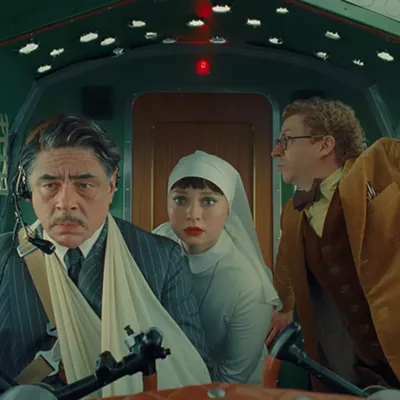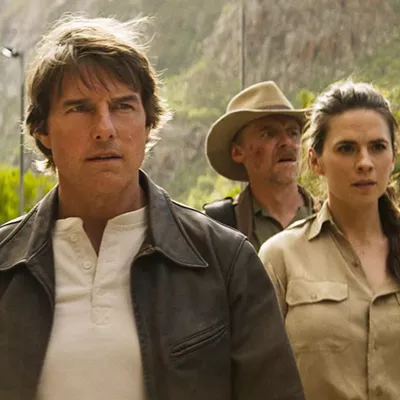In a sense, director Edward Zwick has been making action films for the globally, culturally and historically aware since 1989's Civil War epic Glory. That's a lonely (and narrow) row to hoe, which is perhaps why he chose more facile fare in 2003's The Last Samurai.
Blood Diamond, though, finds him returning to that pyrotechnic activism, crafting one film that's really two. On the one hand, you have a sober and horrifyingly proximate view of the conflict diamond situation. You have warlords and government officials, land rich but cash-strapped. You have common folk -- like Mende fisherman Solomon Vandy (Djimon Hounsou) -- who are raped, mutilated, tortured and enslaved to mine the diamonds. You have the global diamond cartels eager to snap up those diamonds cheaply and quietly so they don't flood the market. Somewhere in the middle of this mess, you have Danny Archer (Leonardo DiCaprio), the amoral Afrikaner smuggler who makes sure certain men get their diamonds while other men get their guns.
On the other hand, you have all the running and ducking and shooting and hiding of good brainless action -- all the explosions, supernatural combat skills, dizzying coincidence, improbable bullet geometries and narrow, inexplicable escapes that make action... well, action.
The film's two personalities run parallel to each other, but are rarely ever onscreen at the same time. The film begins quietly, then there's a brief, frenetic, frankly horrifying chase, as Vandy, his family and fellow villagers try to escape a rebel raid. While Vandy's family escapes, Solomon himself is caught and the action slows again, long enough for exposition by the machete and AK-47 toting rebels (at this point in cinematic history, we know machetes in Africa no longer cut bush, they sever limbs) about the government and the revolution. Each statement comes at the cost of a villager's hand. The action picks back up again the closer and closer Solomon gets to the front of the line. By the time he's on the chopping block, Zwick's back up to action-speed freneticism. Miraculously, Solomon's arm is saved -- the only such male villager, boy or man -- and he's sent to the diamond mines deep in country.
The action then turns to Archer, in the middle of negotiating an arms deal in Sierra Leone. The amorality that the work of a smuggler requires is evident in the way Archer carries himself -- squinty and purposefully blind. Meanwhile, Vandy's wife and two youngest children become refugees, while his oldest boy is stolen into slavery and becomes a child soldier, each family member existing primarily to explain and put a human face to the entire breadth of the plight of Sierra Leone.
Vandy and Archer, in a series of inexplicable and very action-clich & eacute; coincidences, become partners in a quest to retrieve a massive diamond Vandy found and hid. The diamond will buy Archer his retirement; it will buy Vandy his family back. The best and most realistic aspect of DiCaprio's character is that he remains a self-serving manipulator of people throughout the film, essentially extorting Hounsou into partnering with him. It's a gutsy call for a mainstream film's protagonist, but it was the right one.
The only place where Zwick's action and his humanitarianism intersect is in a bloody clash between rebels and government agents in Sierra Leone's capital of Free Town. After mobbing through the city, the rebels turn a corner to find, several blocks off, the government troops behind hastily constructed Jeep barricades. The street in between is absolutely packed with people, including Archer and Solomon, and when the crackle of rebel fire begins, the government troops react in fear and confusion, returning fire, indiscriminately mowing down waves of bystanders. The child soldiers the rebels have trained seem to just be shooting whoever gets in their sights -- shopkeepers, women carrying baskets of goods. While most of the people in the street are doomed, Archer and Solomon have a chance, of course. Danny's ex-special forces and understands urban combat. Even as they escape, though, Zwick's camera lingers on the bloodshed, editorializing the conflict.
If the film joined the action and exposition in a more seamless way, it would have been better, but one gets the sense that the filmmakers' goal was to use the action to keep people riveted and then to fire off as many different messages as possible, much like bullets in that street, hitting people if not with the brutality, then with the plight of the children, and if not with that, then hopefully with the scenes of millions of refugees, an entire country displaced.
After the film ends, a few statistics flash onscreen. One states that there are still more than 200,000 child soldiers throughout Africa. A woman in front of me, who hadn't really seemed stirred by the film, gasped at the number.
Then, when the credits roll and Nas' track "Blood Diamond" plays, Zwick and the producers have pulled out one more stop, connecting Nas' cut to Kanye West's (last year's "Diamonds from Sierra Leone") and Lupe Fiasco's ("Conflict Diamond") and, by extension, to the entire diamond culture in urban America. This is where, if nothing else, we are supposed to feel our own complicity. Though America's upper-crust spend-ocracy is, at best, turning a blind eye to the trade of conflict diamonds, even our marginalized youth, through their glorification of hip-hop excess, share responsibility for the marginalization of others.
Blood Diamond is what passes for a message movie in mainstream Hollywood, and though it's perhaps not as thoughtful as it is visceral, it touches effectively on the emotional centers of conflict: slave labor, child soldiers, refugees, mutilation, rape. The entire film is built like a complex marketing campaign designed to make a pinpoint statement about one very specific crisis to as wide a demographic as possible and then offer what we might do, specifically, to staunch the flow.
As with everything, though, no matter how perfectly delivered the message, people will only listen if they want to hear. And while it's certainly a noble cause to educate people, the message is bound to be an unpalatable one. I can't help but think we, as a movie-going nation and the last superpower, aren't quite done indulging our apathy and greed yet, which means we're not near finding our humanitarian backbone.
BLOOD DIAMOND
(Worth $8)
Rated R
Directed by Edward Zwick
Starring Leonardo DiCaprio, Djimon Hounsou, Jennifer Connelly














